- Home
- Harry Harrison
The Horse Barbarians tds-3 Page 5
The Horse Barbarians tds-3 Read online
Page 5
There was no one in sight when he poked his head out of the camach, so he stopped long enough to lace the flap tightly behind him. He squinted up at the sky once, then turned away among the domed rows.
Head down, he shuffled away through the barbarian camp.
5
No one paid him the slightest attention.
Bundled as they were against the perpetual cold, most 0f the people looked as ragged and nondescript as he did, male and female, young and old. Only the warriors had any distinction of dress, and they could be easily avoided by scuttling off between the camachs whenever he saw one approaching. The rest of the citizenry avoided them as well, so no notice was taken of his actions.
There appeared to be no organized planning of the encampment that he could see. The camachs staggered in uneven rows, thrown up apparently wherever the owners had stopped. They thinned out after a while and Jason found himself skirting a herd of small, shaggy and evil-looking cows. Armed guards, holding tethered moropes, were scattered about, so he made his way by as quickly as was prudent. He heard and smelled a flock of goats nearby, and avoided them as well. Then, suddenly, he was at the last cainach, and the featureless plain was ahead, stretching out to the horizon. The sun was almost down and he squinted at it happily.
“Setting right behind me, or just a little to the right. I remember that much about the ride here. Now if I reverse the direction and march into the sunset I should come to the ship.”
Sure, he thought, if I can make as good time as the thugs did who brought me here. And if I am going in the right direction, and they made no turns. And if none of these bloodthirsty types find me. If — Enough ifs. He shook his head and braced his shoulders, then took a swig of the foul achadh. As he raised the skin to his mouth, he looked about him and saw that he was unobserved. Wiping his mouth on his sleeve, he strolled out into the empty steppe.
He did not go far. As soon as he found a gully that would shelter him from view of the encampment, he dropped down into it. It gave him some protection from the wind, and he pulled his knees up to his chest to conserve heat, then waited there until it was completely dark. It wasn’t the most morale-building way to spend the time, chilled and getting colder as the wind rustled the grass above his head, but there was no other way. He put a rock on the far wall of the gully, ready to mark the exact spot where the sun set, then huddled back against the opposite wall. He brooded about the radio, and even opened it to see if anything could be done, but it was unarguably beyond repair. After that, he just sat and waited for the sun to reach the western horizon and for the stars to come out.
Jason wished that he had done some more stellar observation before the ship had landed, but it was a little late for that now. The constellations would be unfamiliar and he had no idea if there was a pole star or even a dose circumpolar constellation that he could set his course by. One thing he did remember, from constant examination of the maps and charts as they prepared for the landing, was that they had set down almost exactly on the seventieth parallel, at 70 degrees of north latitude right on the head.
Now what did this mean? If there were a north polar star, it would be exactly 70 degrees above the northern horizon. Given a few nights and a protractor, it would be easy enough to find. But his present situation did not allow much time for casual observation. Or the temperature either; he stamped his feet to see if they still had any sensation remaining in them.
The north polar axis would be 70 degrees above the northern horizon, which meant that the sun at noon would be exactly 20 degrees above the southern horizon. It had to be this way every day of the year, because the axis of rotation of the planet was directly vertical to the plane of the ecliptic. No nonsense here about long days and short days, or even seasons for that matter. At any single spot on the planet’s surface the sun always rose from the same place on the horizon. Day after day, year after year, it cut an identical arc across the sky, then set at the same spot on the western horizon as it had the night before. Day and night, all over the planet, were always of equal length. The angle of incidence of the sun’s rays would always remain the same as well, which meant that the amount of radiation reaching any given area would remain constant the year round.
With days and nights of equal length, and the energy input always equal, the weather always remained the same and you were stuck with what you had. The tropics were always hot; the poles, locked in a frigid and eternal embrace.
The sun was now a dim yellow disk balanced on the sharp line of the horizon. At this high latitude, instead of dropping straight down out of sight, it slithered slantways along the horizon. When half the disk was obscured, Jason marked the spot on the far rim, then went over and stood the pointed stone up at that spot. Then he returned to the spot where he had been sitting and squinted along his bearing marker.
“Very fine,” he said out loud. “Now I know where the sun sets, but how do I follow that direction after dark? Think, Jason, think, because right now your life depends upon it.” He shivered, surely because of the cold.
“It would help if I knew just where on the horizon the sun set, how many degrees west of north. With no axial tilt, the problem should be a simple one.” He scratched arcs and angles in the sand and mumbled to himself. “If the axis is vertical, every day must be an equinox, which means that day and night are equal every day, which means, ho-ho!” He tried to snap his fingers, but they were too cold to respond.
“That’s the answer! If the length of the night is to equal the length of the day, then there is only one place for the sun to set and rise, at every latitude from the equator north and south. The sun will have to cut a 80-degree arc through the sky, so it must rise due east and set due west. Eureka!”
Jason put his right ann straight out from his shoulder and shuffled around until his finger was pointing exactly at his marker.
“This is simplicity itself. I am pointing west and facing due south. Now I craftily pull up my left arm and I am pointing due east. All that remains now is to stand in this uncomfortable position until the stars come out.”
In the high, thin air, the first stars were already appearing in the east, though twilight still lingered on the opposite horizon. Jason thought for a moment and decided that he could improve upon the accuracy of the finger-pointing technique. He put a stone on the eastern rim of the gully, just above the spot where he had been sitting. Then he climbed the opposite wall and sighted at it over the first marker stone. A bright blue star lay close to the horizon in the correct spot, and a clear Z-shaped constellation was beginning to be visible around it.
“My guiding star, I shall follow you from afar,” Jason said, and snapped open his belt buckle to look down at the illuminated face of his watch. “Cot you. With a zo-hour day, I can say ten hours of darkness and ten of light. So right now I walk directly away from my star. In five hours it will hit its zenith in the south, right on a line with my left shoulder as I waJk. Then it swoops around and dives down to set directly in front of me about dawn. This is simplicity itself as long as I make adjustments for the new position every hour, or half hour, to allow for the changed position with the passage of time. Hah!”
Snorting this last, he made sure that the Z was directly behind his back, shouldered his club and tramped off in the correct direction. Everything seemed secure enough, but he wished, neither for the first nor the last time, that he had a gyrocompass.
The temperature dropped quickly as the night advanced, and in the dear, dry air the stars burned in distant, twinkling points. Overhead, the constellations wheeled silently high, while the little Z hurried in its low arc until it stood at its zenith at midnight. Jason checked his watch, then dropped onto a crackling hummock of grass. He had been walking for over five hours with only a single break. In spite of his training at zG on Pyrrus, the going was hard. He swigged from the drinking skin and wondered what the temperature was. In spite of its mildly alcoholic content, the acha4h was a half-frozen slush.
Felicity had no mo
ons, but there was more than enough light to see by from the stars. The frigid grayness of the plain stretched away on all sides, silent and motionless except for the dark, moving mass coming up behind him.
Slowly, Jason sank to the ground and lay there, frozen, while the moropes and their riders came near, the ground shivering with the rumble of their feet. They passed, no more than 200 meters from where he lay, and he pressed flat and watched the dark, silent silhouettes until they vanished out of sight to the south.
“Looking for me?” he asked himself, standing and brushing at the furs. “Or are they heading for the ship?”
This latter seemed the most obvious answer. The compactness of the group and their hurried pace indicated some specific destination. And why not? He had been brought from the ship along this route, so it was perfectly understandable that others should follow it as well. He considered going over to attempt to follow their trail, but did not think too highly of the idea. There could be a good bit of traffic back and forth from the ship, and he did not feel like being caught on the barbarian highway by daylight.
When he stood up the wind had a chance to get at him, and a fit of shivering shook him with a giant hand. He was as rested as he was ever going to be, so he might as well press on before he froze to death. Slinging the drinking skin over his shoulder and picking up the club, he began walking again in the correct direction, paralleling the raiders’ track..
Twice more during that seemingly endless night, groups of raiders hurried by in the same direction, while Jason concealed himself against chance observation. Each time it was harder to get up and go on, but
the cold ground was a good persuader. By the time the sky began to lighten in the east, the ‘.5 gravIty had exacted its toll. It took Jason an effort of will to put one foot in front of the other. His guiding constellation was on the horizon, fading in the spreading grayness of dawn, and he went on until it was gone.
It was time to stop. Only by promising himself that he would not walk after sunrise had he managed to keep going at all. He could guide himself easily enough by the sun during the day, but it would be too dangerous. A moving figure could easily be seen at great distances on these plains. And, as the ship was not yet in sight, there was a good deal more walking to be done. He would have to get some rest if he were to go on, and this was possible only during the day.
He half fell, half crawled into the next gully. There was a small overhanging ledge, on the northern side where the sun would strike all day, just the burrow for him. The ledge would keep the wind off him and shield him from sight from above. Pulling his legs up to his chest, he tried to ignore the cold of the ground that struck through his furs and insulated clothing. While he was wondering if, chilled, uncomfortable, exhausted, stifling, he could possibly fall asleep, he fell asleep.
Some sound, some presence bothered him, and he opened one eye and peered out from under the edge of the hat. Two gray-furred animals, with skinny tails and long teeth, were surveying him with wide eyes from the other side of the gully. He said “Boo” and they vanished. The sun felt almost warm now and the ground had either warmed up or his side was too numb to feel anything. He went to sleep again.
The next time he awoke the sun had dropped behind the gully wall and he was in shadow. He knew just what a slab of meat in a frozenfood locker felt like. Moving took almost more effort than he cared to make, and he was afraid that, if he struck his hands or feet against anything, they would crack off. There was still some achadh left in the skin and he swilled it down, which brought on an extended coughing fit. When it was over he felt weaker, though a little bit more alive.
Once again he took his direction from the setting sun and, when the stars came out, started on his way. Walking was much worse than it had been the preceding night. Exertion, his wounds, the lack of food and the heightened gravity exacted their toll. Within an hour he was tottering like an octogenarian and knew that he could not go on like this. He dropped to the ground, panting with exhaustion, and pressed the release that dropped the medikit into his hand.
“I’ve been saving you for the last round. And, if I am not mistaken, I have just heard the final bell ringing.”
Cackling feebly at this insipid witticism, he adjusted the control dial for stimulants, normal strength. He pressed the actuator to the inside of his wrist and felt the sharp bite of the needles striking home.
It worked. Within sixty seconds he became aware that his fatigue was beginning to slip away, masked behind a curtain of drugs. When he stood, he experienced a certain numbness in his limbs, but no tiredness at all.
“Onward!” he shouted, marking his guiding constellation as he slipped the medikit back into its holder.
The night was neither long nor short; it just passed in a pleasant haze. Under the stress of the drugs, his mind worked well and he tried not to think of the physical toll they were exacting. A number of war parties passed, all coming from the direction of the ship, and he hid each time even though most of them were far distant. He wondered if some battle had been fought and if they might have been beaten. Each time, he changed his course slightly to come closer to their line of march, so that there would be no chance of his getting lost.
Soon after three in the morning, Jason found himself stumbling and, at one point, actually trying to walk along on his knees. A full turn of the medikit control set it for stimulants, emergency strength. The injections worked and he went on again at the same regular pace.
It was almost dawn when he began to smell the first traces of some burned odor, which grew stronger with each pace forward. When the sky began to gray in the east, the smell was sharp in his nostrils, and he wondered what significance it might have. Unlike the previous morning, he did not stop but pressed on. This was the last day that he had and he must reach the ship before the stimulants wore off. It could not be too far ahead. He would just have to stay alert and chance walking during the day. He was much smaller than the moropes and their riders and, given any luck at all, he should be able to spot them first.
When he walked into the blackened area of grass, he would not believe it. A fire perhaps, accidentally ignited. It had burned in an exactly circular pattern.
Only when he recognized the rusted and destroyed forms of the mining machinery did he dare admit the truth.
“I’m here. Back at the same spot. This is where we landed.”
He staggered crazily in a circle, looking at the massive emptiness stretching away on all sides.
“This is it!” he shouted. “This is where the ship was. We put the Pugnacious down right here next to the original landing site. Only the ship isn’t here. They’ve left, gone without me….”
Despair froze him and his arms dropped to his sides as he stood there, tottering, his strength gone. The ship, his friends, they were gone as well.
From close by came the rumble of heavy, running feet.
Over the hill rushed five moropes, their riders shouting with predatory glee as they lowered their lances for the kill.
6
With conditioned reflex Jason swung up his arm, his hand crooked and ready for the gun, before he remembered that he had been disarmed.
“Then we’ll do this the old-fashioned way!” he shouted, swinging the iron club in a whistling circle. The odds were well against him, but before he went down they would know that they had been in a fight.
They came in a tight knot, each man trying t6 be first to the kill, jostling one another and leaning far forward with outstretched lances. Jason stood ready, legs wide, waiting for the last possible instant before he moved. The shrieking riders were at the edge of the burnt area.
A muffled explosion was followed instantly by a great, roiling cloud of vapor that hid the attackers from sight. Jason lowered his club and stepped back as a tendril of the cloud twisted toward him. Only one morope made it through the gray vapor, carried along by its momentum, skidding and collapsing with a ground-shaking thud. Its rider catapulted toward Jason and even managed to c
rawl a short distance further, his jaw working with silent hatred, before he, too, collapsed.
When a wisp of the thinned, out gas reached Jason he sniffed, then moved quickly away. Narcogas. It worked instantly and thoroughly on any oxygen-breathing animal, producing paralysis and unconsciousness for about five hours, after which the victim recovered completely, with nothing worse than the nasty side effect of a skull-splitting headache.
What had happened? The ship had certainly gone, and there was no one else in sight. Fatigue was winning out over the effects of the stimulants and his thinking was getting muzzy. He heard the growling rumble for some seconds before he recognized the source of the sound.
It was the rocket launch from the Pugnacious. Blinking up into the clear brightness of the morning sky, he saw the high contrail stretching a white line across the sky toward him, growing larger with each passing second. The launch was first a black dot, then a growing shape, finally a flame-spouting cylinder that touched down less than a hundred meters away. The lock spun open and Meta dropped to the ground, even before the shock absorbers had damped the landing impact.
“Are you all right?” she called, running swiftly to him, the questing muzzle of her gun looking for enemies on all sides.
“Never felt better,” he said, leaning on the club so he would not fall down. ‘What kept you? I thought you had all pulled out and forgotten about me.”
“You know we wouldn’t do that.” She ran her hands over his arms, his back while she talked, as though looking for broken bones, or simply reassuring herself of his presence. “We could not stop them from taking you away, although we tried. Some of them died. An attack was launched on the ship at the same time.”

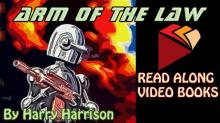 Arm of the Law
Arm of the Law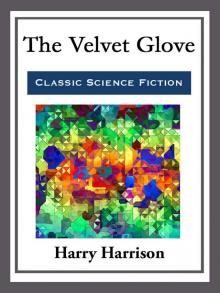 The Velvet Glove
The Velvet Glove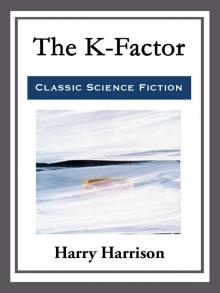 The K-Factor
The K-Factor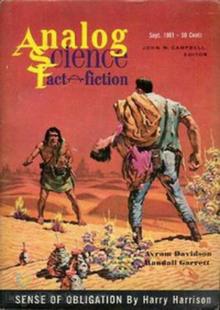 Sense of Obligation
Sense of Obligation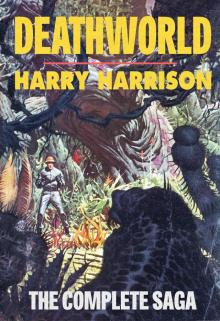 Deathworld: The Complete Saga
Deathworld: The Complete Saga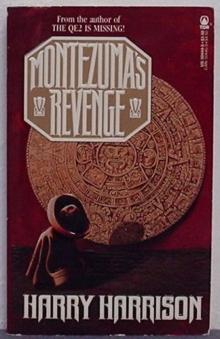 Montezuma's Revenge
Montezuma's Revenge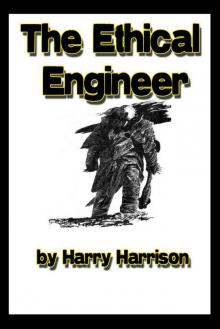 The Ethical Engineer
The Ethical Engineer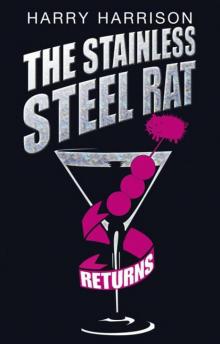 The Stainless Steel Rat Returns
The Stainless Steel Rat Returns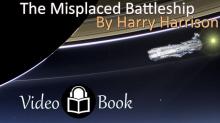 The Misplaced Battleship
The Misplaced Battleship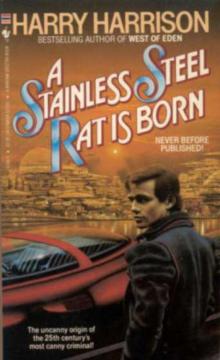 The Stainless Steel Rat is Born
The Stainless Steel Rat is Born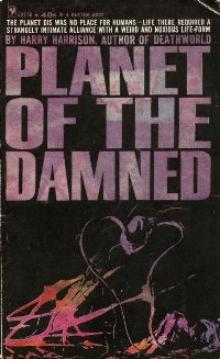 Planet of the Damned bb-1
Planet of the Damned bb-1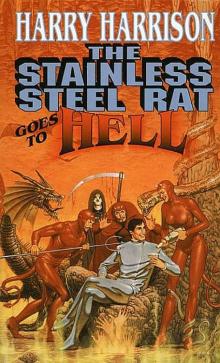 The Stainless Steel Rat Goes to Hell ssr-10
The Stainless Steel Rat Goes to Hell ssr-10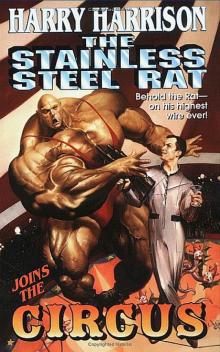 The Stainless Steel Rat Joins the Circus ssr-11
The Stainless Steel Rat Joins the Circus ssr-11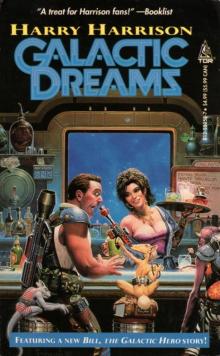 Galactic Dreams
Galactic Dreams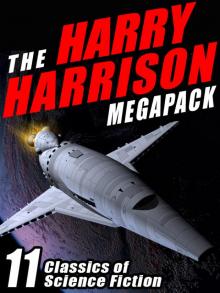 The Harry Harrison Megapack
The Harry Harrison Megapack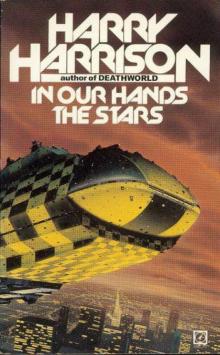 In Our Hands the Stars
In Our Hands the Stars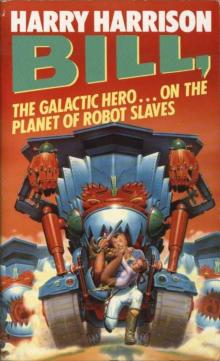 On the Planet of Robot Slaves
On the Planet of Robot Slaves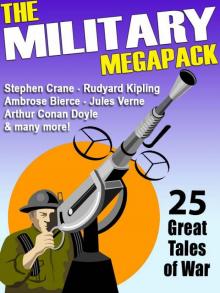 The Military Megapack
The Military Megapack Make Room! Make Room!
Make Room! Make Room! Wheelworld
Wheelworld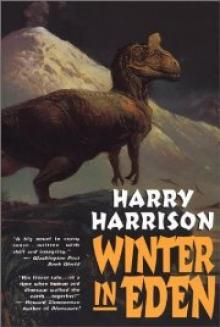 Winter in Eden e-2
Winter in Eden e-2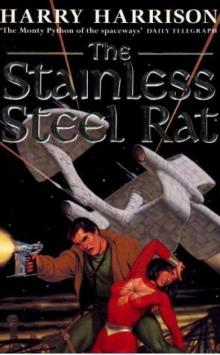 The Stainless Steel Rat
The Stainless Steel Rat The Stainless Steel Rat Goes to Hell
The Stainless Steel Rat Goes to Hell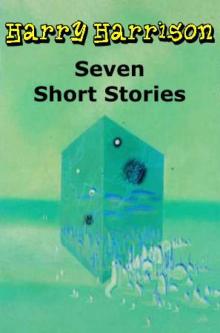 Harry Harrison Short Stoies
Harry Harrison Short Stoies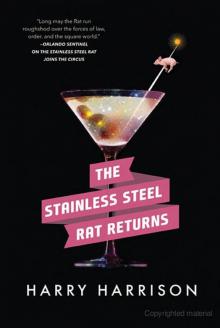 Stainless Steel Rat 11: The Stainless Steel Rat Returns
Stainless Steel Rat 11: The Stainless Steel Rat Returns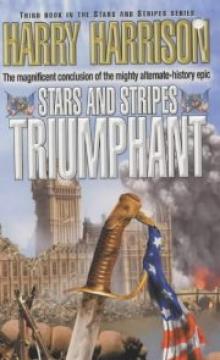 Stars and Stripes Triumphant sas-3
Stars and Stripes Triumphant sas-3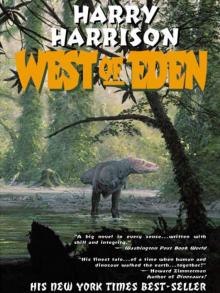 West of Eden
West of Eden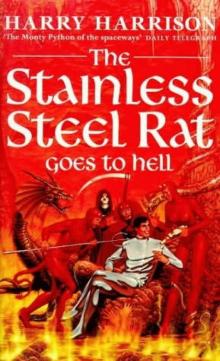 The Stainless Steel Rat Go's To Hell
The Stainless Steel Rat Go's To Hell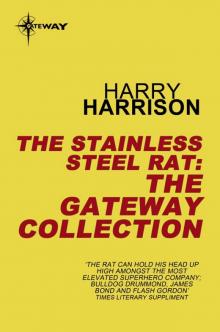 The Stainless Steel Rat eBook Collection
The Stainless Steel Rat eBook Collection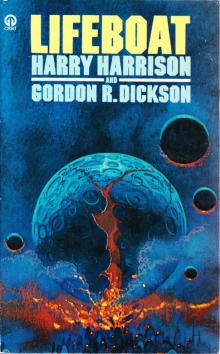 Lifeboat
Lifeboat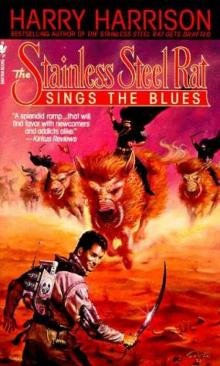 The Stainless Steel Rat Sings the Blues
The Stainless Steel Rat Sings the Blues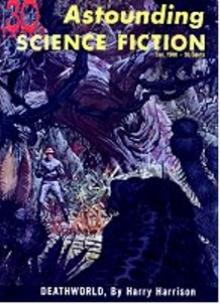 Deathworld tds-1
Deathworld tds-1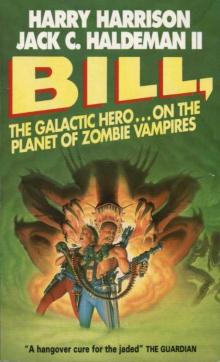 On the Planet of Zombie Vampires
On the Planet of Zombie Vampires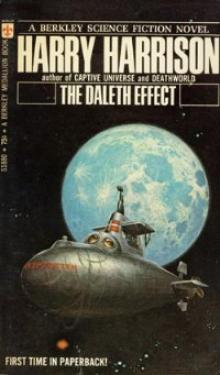 The Daleth Effect
The Daleth Effect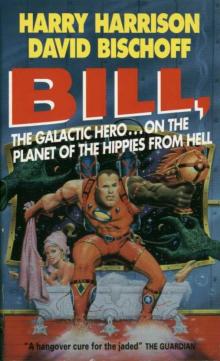 On The Planet Of The Hippies From Hell
On The Planet Of The Hippies From Hell The Turing Option
The Turing Option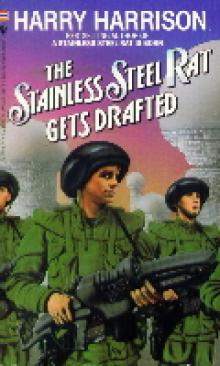 The Stainless Steel Rat Gets Drafted
The Stainless Steel Rat Gets Drafted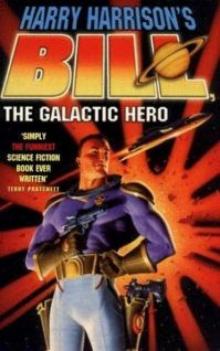 Bill, the Galactic Hero btgh-1
Bill, the Galactic Hero btgh-1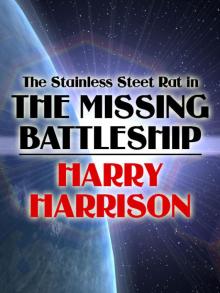 The Stainless Steel Rat in The Missing Battleship
The Stainless Steel Rat in The Missing Battleship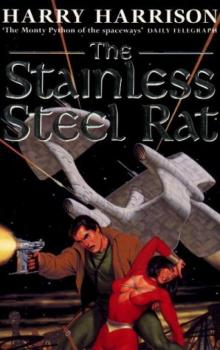 The Stainless Steel Rat ssr-1
The Stainless Steel Rat ssr-1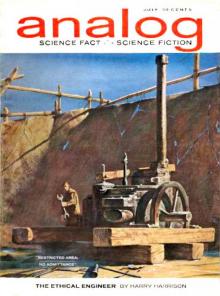 The Ethical Engineer (the deathworld series)
The Ethical Engineer (the deathworld series)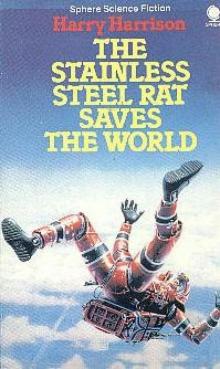 The Stainless Steel Rat Saves the World ssr-3
The Stainless Steel Rat Saves the World ssr-3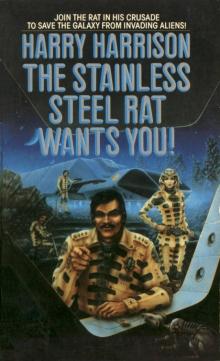 The Stainless Steel Rat Wants You
The Stainless Steel Rat Wants You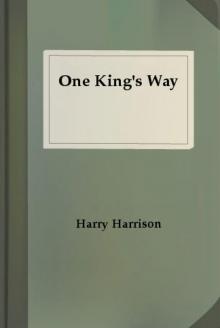 One King's Way thatc-2
One King's Way thatc-2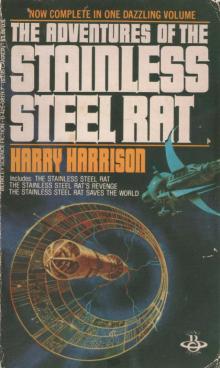 The Stainless Steel Rat Saves The World
The Stainless Steel Rat Saves The World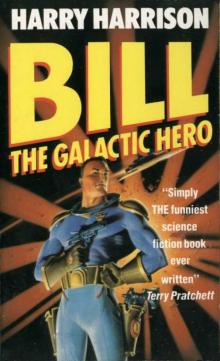 Bill, the Galactic Hero
Bill, the Galactic Hero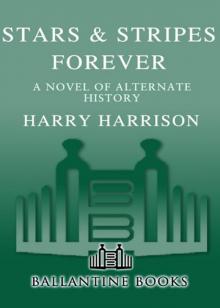 Stars & Stripes Forever
Stars & Stripes Forever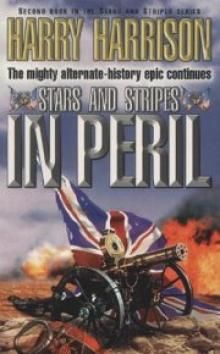 Stars and Stripes In Peril sas-2
Stars and Stripes In Peril sas-2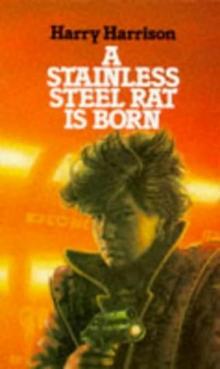 A Stainless Steel Rat Is Born ssr-6
A Stainless Steel Rat Is Born ssr-6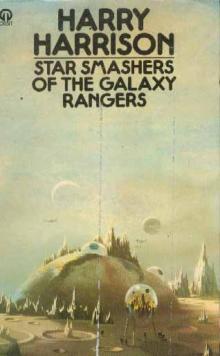 Star Smashers of the Galaxy Rangers
Star Smashers of the Galaxy Rangers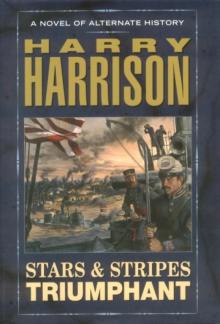 Stars & Stripes Triumphant
Stars & Stripes Triumphant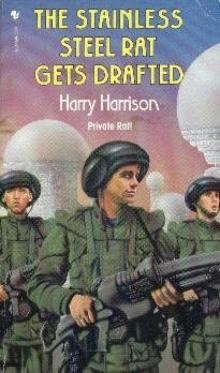 The Stainless Steel Rat Gets Drafted ssr-7
The Stainless Steel Rat Gets Drafted ssr-7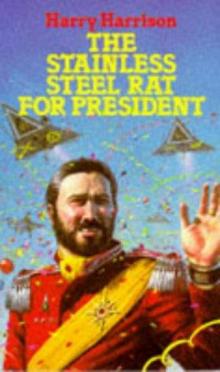 The Stainless Steel Rat for President ssr-5
The Stainless Steel Rat for President ssr-5 The Hammer & the Cross
The Hammer & the Cross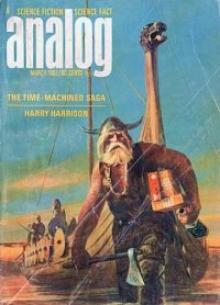 The Technicolor Time Machine
The Technicolor Time Machine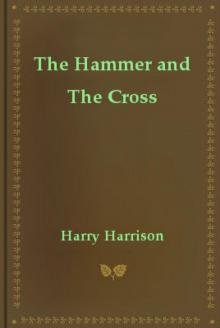 The Hammer and The Cross thatc-1
The Hammer and The Cross thatc-1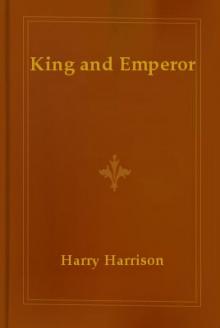 King and Emperor thatc-3
King and Emperor thatc-3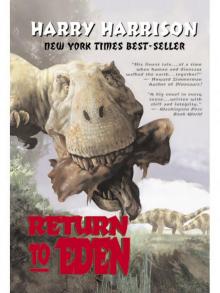 Return to Eden
Return to Eden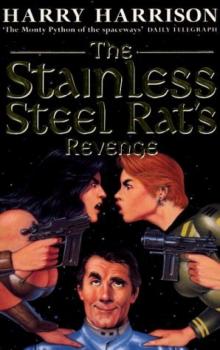 The Stainless Steel Rat’s Revenge ssr-2
The Stainless Steel Rat’s Revenge ssr-2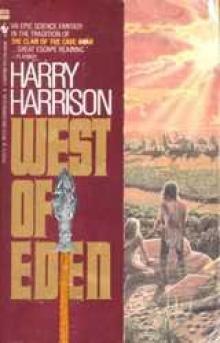 West of Eden e-1
West of Eden e-1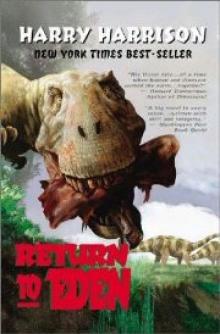 Return to Eden e-3
Return to Eden e-3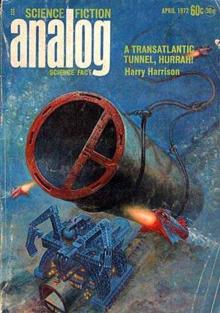 A Transatlantic Tunnel, Hurrah!
A Transatlantic Tunnel, Hurrah!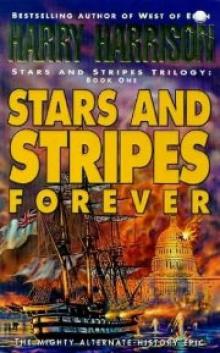 Stars and Stripes Forever sas-1
Stars and Stripes Forever sas-1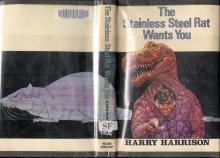 The Stainless Steel Rat Wants You ssr-4
The Stainless Steel Rat Wants You ssr-4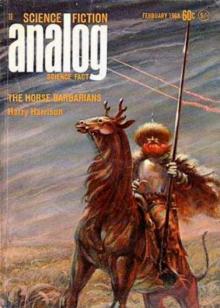 The Horse Barbarians tds-3
The Horse Barbarians tds-3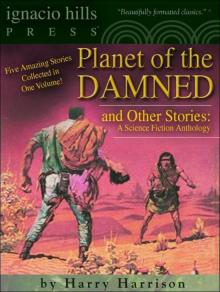 Planet of the Damned and Other Stories: A Science Fiction Anthology (Five Books in One Volume!)
Planet of the Damned and Other Stories: A Science Fiction Anthology (Five Books in One Volume!)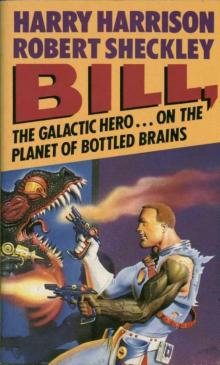 On the Planet of Bottled Brains
On the Planet of Bottled Brains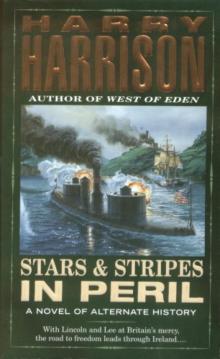 Stars And Stripes In Peril
Stars And Stripes In Peril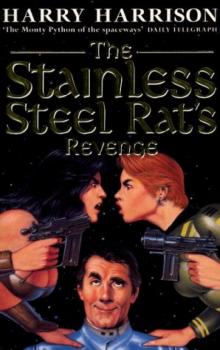 The Stainless Steel Rat's Revenge
The Stainless Steel Rat's Revenge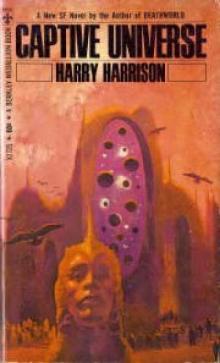 Captive Universe
Captive Universe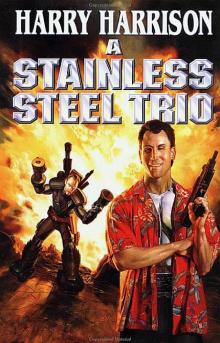 The Stainless Steell Rat Sings the Blues ssr-8
The Stainless Steell Rat Sings the Blues ssr-8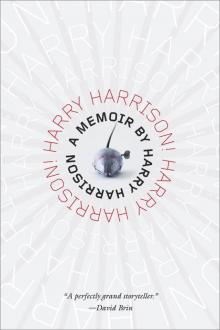 Harry Harrison! Harry Harrison!
Harry Harrison! Harry Harrison!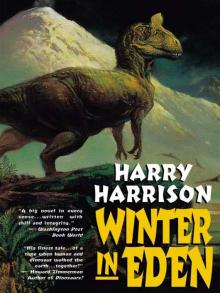 Winter in Eden
Winter in Eden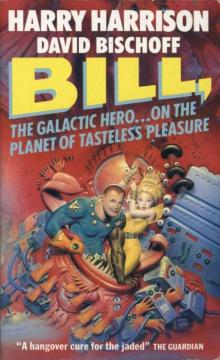 On the Planet of Tasteless Pleasures
On the Planet of Tasteless Pleasures